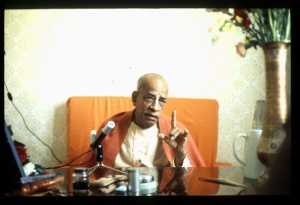SB 10.84.55-56: Difference between revisions
m (1 revision(s)) |
(Vanibot #0054 edit - transform synonyms into clickable links, which search similar occurrences) |
||
| (One intermediate revision by one other user not shown) | |||
| Line 1: | Line 1: | ||
{{info | {{info | ||
|speaker= | |speaker=Śukadeva Gosvāmī | ||
|listener=King | |listener=King Parīkṣit | ||
}} | }} | ||
[[Category:Srimad-Bhagavatam - Canto 10 Chapter 84]] | |||
[[Category:Bhagavatam Verses Spoken by Sukadeva Gosvami - Vanisource|108455]] | |||
<div style="float:left">'''[[Srimad-Bhagavatam]] - [[SB 10|Tenth Canto]] - [[SB 10.84: The Sages' Teachings at Kuruksetra|Chapter 84: The Sages' Teachings at Kurukṣetra]]'''</div> | |||
<div style="float:right">[[File:Go-previous.png|link=SB 10.84.54]] '''[[SB 10.84.54]] - [[SB 10.84.57-58]]''' [[File:Go-next.png|link=SB 10.84.57-58]]</div> | |||
{{RandomImage}} | |||
{{SBnotice}} | |||
==== TEXTS 55-56 ==== | ==== TEXTS 55-56 ==== | ||
<div | <div class="verse"> | ||
bandhūn sa-dārān sa-sutān | :bandhūn sa-dārān sa-sutān | ||
pāribarheṇa bhūyasā | :pāribarheṇa bhūyasā | ||
vidarbha-kośala-kurūn | :vidarbha-kośala-kurūn | ||
kāśi-kekaya-sṛñjayān | :kāśi-kekaya-sṛñjayān | ||
sadasyartvik-sura-gaṇān | |||
nṛ-bhūta-pitṛ-cāraṇān | :sadasyartvik-sura-gaṇān | ||
śrī-niketam anujñāpya | :nṛ-bhūta-pitṛ-cāraṇān | ||
śaṁsantaḥ prayayuḥ kratum | :śrī-niketam anujñāpya | ||
:śaṁsantaḥ prayayuḥ kratum | |||
</div> | </div> | ||
| Line 21: | Line 27: | ||
==== SYNONYMS ==== | ==== SYNONYMS ==== | ||
<div | <div class="synonyms"> | ||
''[//vanipedia.org/wiki/Special:VaniSearch?s=bandhūn&tab=syno_o&ds=1 bandhūn]'' — his relatives; ''[//vanipedia.org/wiki/Special:VaniSearch?s=sa&tab=syno_o&ds=1 sa]-[//vanipedia.org/wiki/Special:VaniSearch?s=dārān&tab=syno_o&ds=1 dārān]'' — with their wives; ''[//vanipedia.org/wiki/Special:VaniSearch?s=sa&tab=syno_o&ds=1 sa]-[//vanipedia.org/wiki/Special:VaniSearch?s=sutān&tab=syno_o&ds=1 sutān]'' — with their children; ''[//vanipedia.org/wiki/Special:VaniSearch?s=pāribarheṇa&tab=syno_o&ds=1 pāribarheṇa]'' — with gifts; ''[//vanipedia.org/wiki/Special:VaniSearch?s=bhūyasā&tab=syno_o&ds=1 bhūyasā]'' — opulent; ''[//vanipedia.org/wiki/Special:VaniSearch?s=vidarbha&tab=syno_o&ds=1 vidarbha]-[//vanipedia.org/wiki/Special:VaniSearch?s=kośala&tab=syno_o&ds=1 kośala]-[//vanipedia.org/wiki/Special:VaniSearch?s=kurūn&tab=syno_o&ds=1 kurūn]'' — the leaders of the Vidarbha, Kośala and Kuru clans; ''[//vanipedia.org/wiki/Special:VaniSearch?s=kāśi&tab=syno_o&ds=1 kāśi]-[//vanipedia.org/wiki/Special:VaniSearch?s=kekaya&tab=syno_o&ds=1 kekaya]-[//vanipedia.org/wiki/Special:VaniSearch?s=sṛñjayān&tab=syno_o&ds=1 sṛñjayān]'' — also the Kāśīs, Kekayas and Sṛñjayas; ''[//vanipedia.org/wiki/Special:VaniSearch?s=sadasya&tab=syno_o&ds=1 sadasya]'' — the officials of the sacrificial assembly; ''[//vanipedia.org/wiki/Special:VaniSearch?s=ṛtvik&tab=syno_o&ds=1 ṛtvik]'' — the priests; ''[//vanipedia.org/wiki/Special:VaniSearch?s=sura&tab=syno_o&ds=1 sura]-[//vanipedia.org/wiki/Special:VaniSearch?s=gaṇān&tab=syno_o&ds=1 gaṇān]'' — the various classes of demigods; ''[//vanipedia.org/wiki/Special:VaniSearch?s=nṛ&tab=syno_o&ds=1 nṛ]'' — the humans; ''[//vanipedia.org/wiki/Special:VaniSearch?s=bhūta&tab=syno_o&ds=1 bhūta]'' — ghostly spirits; ''[//vanipedia.org/wiki/Special:VaniSearch?s=pitṛ&tab=syno_o&ds=1 pitṛ]'' — forefathers; ''[//vanipedia.org/wiki/Special:VaniSearch?s=cāraṇān&tab=syno_o&ds=1 cāraṇān]'' — and Cāraṇas, members of a class of minor demigods; ''[//vanipedia.org/wiki/Special:VaniSearch?s=śrī&tab=syno_o&ds=1 śrī]-[//vanipedia.org/wiki/Special:VaniSearch?s=niketam&tab=syno_o&ds=1 niketam]'' — from Lord Kṛṣṇa, the abode of the goddess of fortune; ''[//vanipedia.org/wiki/Special:VaniSearch?s=anujñāpya&tab=syno_o&ds=1 anujñāpya]'' — taking leave; ''[//vanipedia.org/wiki/Special:VaniSearch?s=śaṁsantaḥ&tab=syno_o&ds=1 śaṁsantaḥ]'' — praising; ''[//vanipedia.org/wiki/Special:VaniSearch?s=prayayuḥ&tab=syno_o&ds=1 prayayuḥ]'' — they departed; ''[//vanipedia.org/wiki/Special:VaniSearch?s=kratum&tab=syno_o&ds=1 kratum]'' — the sacrificial performance. | |||
</div> | </div> | ||
{{SBcollapse}} | |||
==== TRANSLATION ==== | ==== TRANSLATION ==== | ||
<div | <div class="translation"> | ||
With opulent gifts he honored his relatives, including all their wives and children; the royalty of the Vidarbha, Kosala, Kuru, Kāśī, Kekaya and Sṛñjaya kingdoms; the officiating members of the assembly; and also the priests, witnessing demigods, humans, spirits, forefathers and Cāraṇas. Then, taking permission from Lord Kṛṣṇa, the shelter of the goddess of fortune, the various guests departed as they all chanted the glories of Vasudeva's sacrifice. | With opulent gifts he honored his relatives, including all their wives and children; the royalty of the Vidarbha, Kosala, Kuru, Kāśī, Kekaya and Sṛñjaya kingdoms; the officiating members of the assembly; and also the priests, witnessing demigods, humans, spirits, forefathers and Cāraṇas. Then, taking permission from Lord Kṛṣṇa, the shelter of the goddess of fortune, the various guests departed as they all chanted the glories of Vasudeva's sacrifice. | ||
</div> | </div> | ||
__NOTOC__ | </div> | ||
</div> | |||
<div style="float:right">[[File:Go-previous.png|link=SB 10.84.54]] '''[[SB 10.84.54]] - [[SB 10.84.57-58]]''' [[File:Go-next.png|link=SB 10.84.57-58]]</div> | |||
__NOTOC__ | |||
__NOEDITSECTION__ | |||
Latest revision as of 20:07, 17 February 2024

A.C. Bhaktivedanta Swami Prabhupada
Please note: The synonyms, translation and purport of this verse were composed by disciples of Śrīla Prabhupāda
TEXTS 55-56
- bandhūn sa-dārān sa-sutān
- pāribarheṇa bhūyasā
- vidarbha-kośala-kurūn
- kāśi-kekaya-sṛñjayān
- sadasyartvik-sura-gaṇān
- nṛ-bhūta-pitṛ-cāraṇān
- śrī-niketam anujñāpya
- śaṁsantaḥ prayayuḥ kratum
SYNONYMS
bandhūn — his relatives; sa-dārān — with their wives; sa-sutān — with their children; pāribarheṇa — with gifts; bhūyasā — opulent; vidarbha-kośala-kurūn — the leaders of the Vidarbha, Kośala and Kuru clans; kāśi-kekaya-sṛñjayān — also the Kāśīs, Kekayas and Sṛñjayas; sadasya — the officials of the sacrificial assembly; ṛtvik — the priests; sura-gaṇān — the various classes of demigods; nṛ — the humans; bhūta — ghostly spirits; pitṛ — forefathers; cāraṇān — and Cāraṇas, members of a class of minor demigods; śrī-niketam — from Lord Kṛṣṇa, the abode of the goddess of fortune; anujñāpya — taking leave; śaṁsantaḥ — praising; prayayuḥ — they departed; kratum — the sacrificial performance.
Translation and purport composed by disciples of Śrīla Prabhupāda
TRANSLATION
With opulent gifts he honored his relatives, including all their wives and children; the royalty of the Vidarbha, Kosala, Kuru, Kāśī, Kekaya and Sṛñjaya kingdoms; the officiating members of the assembly; and also the priests, witnessing demigods, humans, spirits, forefathers and Cāraṇas. Then, taking permission from Lord Kṛṣṇa, the shelter of the goddess of fortune, the various guests departed as they all chanted the glories of Vasudeva's sacrifice.